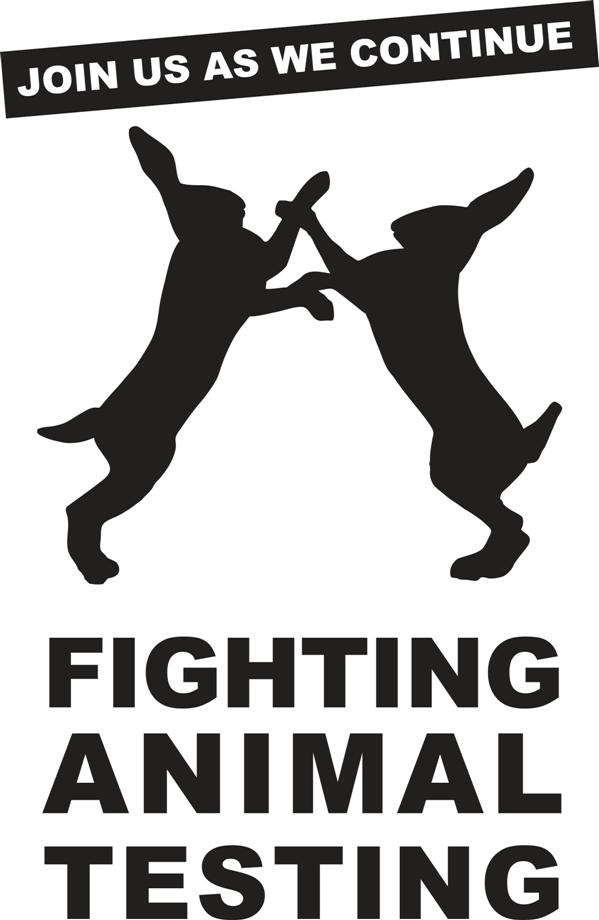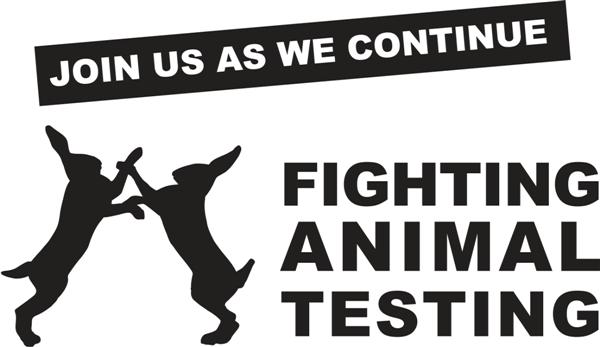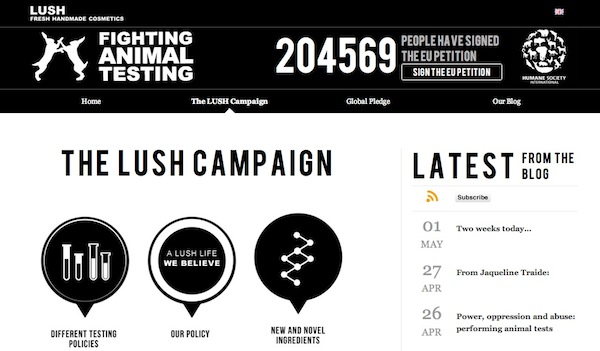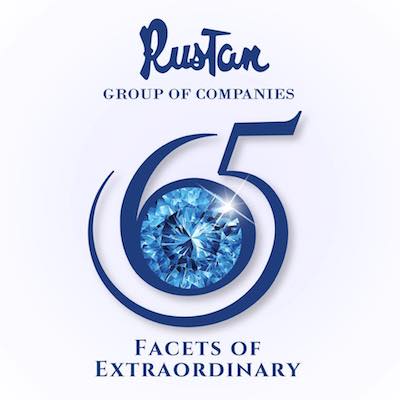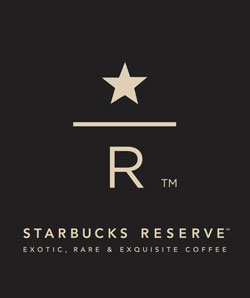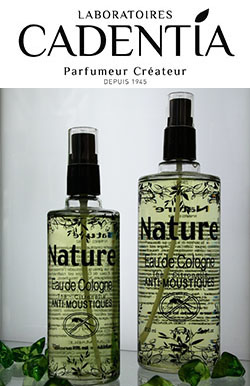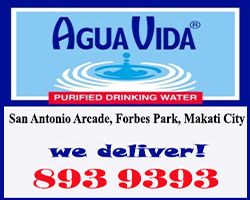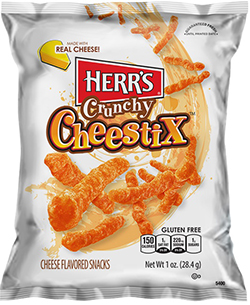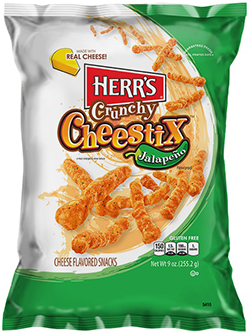We encourage you to sign up and add signatures of support in your nearest Lush store windows and be a part of Lush’s campaign to stop cruelty to animals and put the animal testing fight back on the high street.
You can sign your petitions until May 7, 2012.
The petitions signed on the paper will be submitted to Humane Society International for the worldwide campaign against animal testing on cosmetic products.
FIGHTING ANIMAL TESTING– TALKING POINTS
WHAT IS THE CAMPAIGN ALL ABOUT?
The campaign is about fighting against animal testing for Cosmetics.
Testing on animals for cosmetics still exists in this industry. We think this is wrong, so all Lush stores and staff around the world are uniting to ask the public to show their support by signing an H.S.I (Humane Society International) petition or a pledge.
LUSH IS A SOAP RETAILER, WHY ARE YOU CAMPAIGNING TO PROTECT ANIMALS?
LUSH’s founders have been standing up against animal testing for 30 years and don’t intend to stop fighting! We are angry that animal testing for cosmetics is still happening and we will use our shops fronts, our web site, our staff, anything we can touch to continue this fight until animal testing is history. As an ethical cosmetic manufacturer and retailer, we can’t sit back and continue to allow our competitors to torture animals so they can market the so called “latest and greatest.”
THE ISSUE: ANIMAL TESTING IN COSMETICS
WHAT IS A COSMETIC?
The definition of “cosmetics” usually includes personal care products such as skin creams, soaps, deodorants, shampoos, sunscreens and toothpastes, as well as perfumes, hair dyes and other beauty items.
WHAT IS ‘COSMETICS TESTING’ AND WHY IS IT DONE?
According to Global Cosmetics Industry Magazine, the cosmetics industry generates approximately $230 billion in global sales. Raw materials that make up these cosmetic products (and sometimes finished product) are tested to see whether they are likely to harm people, or damage the environment Many of the tests that have traditionally been used involve animals. For example, rabbits and rats were used to assess whether a substance will cause irritation to the skin or eyes or cause illness if swallowed. However there has been much scientific and public debate about the effectiveness of testing products for humans on animals.
IS ANIMAL TESTING REQUIRED FOR COSMETICS AND CONSUMER PRODUCTS?
In most countries, no (In mainland
The European Union has gone further by introducing testing and marketing bans, which currently prohibit: 1) the use of animals for cosmetic testing purposes within the EU, 2) the sale of finished cosmetic products that have been tested on animals, and 3) the sale of cosmetic products whose raw ingredients have been subject to certain animal tests after March 2009. The final phase of the sale/marketing ban is due to come into force in 2013 and will finally make the EU a cruelty-free cosmetics zone, but the European Commission is now threatening further delay.
WHAT ANIMAL TESTS ARE CARRIED OUT ON COSMETICS AND CONSUMER PRODUCTS?
These tests usually attempt to measure skin irritancy, eye tissue damage, and toxicity.
For example, In the Draize test, substances are forced in the eye of conscious rabbits to evaluate damage to sensitive eye tissues. This can be extremely painful for the rabbits, who often scream when the substances are applied and sometimes break their necks or backs trying to escape the restraints.
Lethal Dosage (LD) tests are used to determine the amount of a substance that will kill an agreed ratio of animals. For example, in the LD50 test, 100 animals are exposed to the substance (through stomach tubes, vapor spray inhalers or injection) until 50 of them die.
WHAT ARE THE CONDITIONS UNDER WHICH ANIMALS ARE TESTED?
Animal testing (also called ‘vivisection’) is arguably the most severe form of systematic violence against animals in the modern world. Firstly it involves the imprisonment of animals in laboratories, often in barren cages, undergoing the stress of excessive handling for testing, which can cause both physical harm and psychological distress. Testing often involves extreme suffering they can be poisoned, mutilated, given diseases and often killed. After the animals have been used in experiments they are usually killed, although many will be used in ongoing experiments over a period of months, or even years.
ARE ANIMALS USED IN TESTING GIVEN PAIN RELIEF OR OTHER PROTECTIONS?
No, pain relief is not provided. Additionally, in some countries (for example the United States) laboratory-bred rats and mice and non-mammalian species are not listed or protected under the national law that establishes standards for animals used in experiments (they are not regarded as ‘animals’. The situation is even worse in some countries that do not have any legislation governing the care and use of animals in laboratories.
IS ANIMAL TESTING RELIABLE?
No. Not only is animal testing inhumane; it is inherently unreliable when trying to assess human safety. The truth is that animal testing is a cruel and fundamentally flawed method of assessing a product or ingredient’s safety. Species differences is one of the main complicating factors – in testing, animals are used as surrogates for humans and exposed to chemicals to see what effects they have. However, species differences between humans and other animals, and between different species or even strains of animals, can have a fundamental impact of how relevant or reliable the test results are. These differences in anatomy, metabolism, physiology or pharmacology inevitably will arise and when compounded by further species-specific genetic variations, the scientific validity of results can be very dubious indeed. Even subtle differences at the molecular level can go on to have a significant effect at the organ or systems level on the validity of results for extrapolation from animals to humans.
HOW MANY ANIMALS ARE KILLED EACH YEAR IN ANIMAL EXPERIMENTS?
Estimates exist that say 100 million animals are used in experiments worldwide (including testing), which is about 274,000 per day, or three every second.; however, this estimate is for vertebrates only.
IS THERE ANY LEGISLATION TO LIMIT ANIMAL TESTING FOR COSMETIC PURPOSES?
The most stringent bans in the world at the moment are in
(
In 2009 animal testing of cosmetics products & ingredients was banned within the EU as part of the 7th amendment to the Cosmetics Directive. This Directive also contained a 3-phase sales or marketing ban to end the sale of cosmetic products containing ingredients tested on animals outside the EU.
How the sales ban works:
· Phase one 2004: prohibited marketing of cosmetics ingredients tested on animals using test methods that have been replaced in the EU;
· Phase two 2009: banned sale of cosmetics tested on animals for all but three animal tests––repeat dose toxicity, reproductive toxicity and toxicokinetics;
· Phase three: sale ban should apply to these last three animal tests and is due to come into force in 2013. However, the European Commission has indicated that it may propose delaying or weakening this final phase of the sales ban, which would allow companies to continue animal testing and selling their products in the EU. It is full and timely implementation of this final 2013 sales ban that Humane Society International is campaigning for and Lush is supporting.
(
No laws exist in the
(
Testing in
CAN TESTING BE DONE WITHOUT USING ANIMALS?
Yes. Unlike crude, ‘traditional’ animal tests, non-animal methods usually take less time to complete, costs less and are not plagued with species differences that make conclusions difficult or impossible.
Effective, affordable, and humane research methods include studies of human populations, volunteers, and patients as well as sophisticated in vitro, genomic, and computer-modeling techniques.
WHAT ARE SOME PRACTICAL ALTERNATIVES TO ANIMAL TESTING?
Non-animal testing methods that are more reliable and less expensive have been developed. These make use of human cell and skin tissue cultures, corneas from eye banks, and sophisticated computer and mathematical models. Some companies avoid testing altogether by using non-toxic natural ingredients or combinations of the near 20,000 existing cosmetic ingredients that have already been established as safe and require no further testing.
Does ‘cruelty-free’ always mean the same thing?
The “cruelty-free” label can be misleading. Some companies may say their products are “cruelty-free” or “not tested on animals,” but they could just be talking about the finished product (not to specific ingredients, the bulk of animal testing happens on the ingredient level). Or they hire outside laboratories to do the testing for them.
THE CAMPAIGN: LUSH FIGHTING AGAINST ANIMAL TESTING
DOES LUSH TEST ITS PRODUCTS OR INGREDIENTS ON ANIMALS?
Absolutely not! Lush has a unique policy. We do not buy any ingredient from any supplier that tests any materials on any animals for any purpose. This policy is unique in the cosmetics world and is pioneering a new way to stop animal tests for cosmetics. LUSH runs a Supplier Specific Boycott Policy. By doing this we have convinced companies to switch to cruelty free practices as a result. If a company will alter their practices, we will buy their goods!
At the current time LUSH is the only company with such a policy, and by adopting this policy we do not mean to criticize the efforts of any organization or company with policies to end animal cruelty.
Our policy is the result of a personal effort to reduce animal testing, for companies who supply raw materials to change the way they test for safety and to stop money from going to companies who we believe are morally unsound.
IF LUSH DOESN’T TEST ON ANIMALS, HOW DO WE MAKE SURE OUR PRODUCTS ARE SAFE TO USE?
LUSH feels that not only is the testing of cosmetic products and ingredients on animals unnecessary and unethical, but it is also scientifically unreliable, unable to adequately access the safety or efficiency of a product or ingredient, and may even allow unsafe products onto the market. We prefer to know that our products are safe for the humans that are going to be using them, so all of our products go through a rigorous assessment and human trials using our panel of volunteer human testers. We prefer to use only natural ingredients with a proven record of safe use, and where we have to use synthetic ingredients we again use only those with a long and proven record of safe use.
WHAT IS LUSH DOING TO SPARE ANIMALS FROM COSMETIC AND PRODUCT TESTING?
LUSH is committed to ending animal testing—forever. First and foremost, we don’t test any of our products or ingredients on animals, nor do we buy ingredients from suppliers who engage in any animal testing. Secondly, alongside our campaign partners we are working hard to lobby politicians across the globe to ban animal testing for cosmetics as well as the selling of animal-tested cosmetics.
We are also converting LUSH stores across the globe into campaign centre’s where we are shedding light on this horrific side of the cosmetics industry and urging customers to sign either a petition (or in some countries, a personal pledge) to bring animal testing for cosmetics to an end forever.
WHAT IS LUSH ASKING THE PUBLIC TO DO?
We are asking the public to join our fight against animal testing,
to sign:
1.the H.S.I “Cruelty Free 2013” petition in
2. “Be Cruelty Free” as a petition in Aus/NZ/North America and
or
3. to sign up to “Be Cruelty Free” simply as a pledge (All other countries)
and to stop supporting businesses who continue to engage in animal testing.
WHAT ARE THE PETITIONS ASKING FOR?
Customers are being asked to sign the HSI petition “Cruelty Free 2013”
The European Union promised that from 2013, the sale of animal-tested cosmetics would be banned, meaning the EU would become the world’s first cruelty-free cosmetics zone. An EU sales ban would also force companies around the world to stop cosmetics animal testing or have their products removed from EU shop shelves. But now EU decision-makers are looking to delay the ban by up to 10 years, meaning more unnecessary animal testing.
The petition states:
“We urge you to enforce the Cosmetics Directive’s 2013 ban on the marketing of animal-tested cosmetics in the European Union, and to reject any proposal to delay. Causing animals pain and suffering to produce beauty products is morally unjustifiable. The EU has already banned such testing in its own labs, but it continues elsewhere around the world because companies know they can still sell their products in the EU. We want the suffering to end. We want the EU to be Cruelty-Free in 2013.” The Cruelty-Free 2013 petition has so far been signed by 142,206 people calling for an end to animal-tested cosmetics
We are asking our customers to sign the Be Cruelty-Free petition calling on the Government of Canada/American Government to ban cosmetics animal testing in Canada/USA as well as the sale of new cosmetics that have been tested on animals. These petitions will be circulating throughout all of 150 of our
Aus/NZ and
We are asking our customers to sign the Be Cruelty-Free petition/pledge calling on the Government to ban cosmetics animal testing, as well as the sale of new cosmetics that have been tested on animals. These petitions will then be submitted to government by the HSI and Lush.
Rest of the world:
We will be asking customers to sign up to “Be Cruelty-Free” as a global pledge against animal testing- These countries will not be petitioning governments but will be starting with gaining the support of the public.
The pledge states:
“I believe that animals shouldn’t suffer and die to test cosmetics or their ingredients.
All cosmetics should be cruelty-free and I support a ban on cosmetics animal testing and on the sale of new cosmetics that have been tested on animals.”
COULD THIS PETITION ACTUALLY MAKE A DIFFERENCE?
Absolutely, we’ve seen steps in the right direction in the European Union. On March 11, 2009, the European Union banned cosmetics animal testing and a 3-phase sales ban But no such laws exist yet in __________________
Even in countries where a customer is simply signing a pledge this shows that there is support. That people have engaged with the issue and are keen to support is a great start
WHO IS THE HUMANE SOCIETY INTERNATIONAL? WHAT DO THEY DO?
Humane Society International is one of the world’s largest animal protection organizations with offices in the UK, USA, EU, Canada, Australia and India and active hands-on programmes in countries worldwide.
For nearly 20 years, we’ve been working for the protection of all animals through the use of science, campaign advocacy, education and hands-on programmes. Our work celebrates animals and confronts cruelty worldwide — wherever they need our help. Whether it’s wildlife in peril, animals suffering on factory farms or in laboratories, abused and neglected pets or animals in need of rescue and emergency aid, with the help of our advocates and donors, HSI is there protecting animals in distress. HSI lobbyists also work across the globe strengthening laws to protect animals from exploitation. Our direct hands-on rescue and rehab projects mean working with local communities and animal organizations to spread the culture of compassion.
HSI is campaigning to end animal testing across the world. By advancing humane science with more reliable non-animal techniques, we’re saving animals’ lives and improving the quality of scientific research for people and the planet at the same time. Our scientific and lobbying team work painstakingly to exploit every opportunity to remove animals from regulatory test regulations and replace them with humane alternatives. For example, a two-year long project executed by HSI’s Research & Toxicology team recently resulted in the largest ever cut in history in animal test requirements from a piece of legislation (EU pesticides regs), sparing tens of thousands of animals unnecessary pain and suffering. We’re also at the forefront of efforts to replace animals in toxicology with 21st century non-animal techniques – working together with government agencies, scientists and companies to achieve a world without animal testing.
HOW IS LUSH WORKING WITH THE H.S.I?
We are working to support Humane Society International’s “Cruelty Free 2013” petition in the EU and also their global “Be Cruelty-Free” petition pledge in countries outside the EU.
Note the collaboration effort happening in your country if there is one…this applies only to
ARE YOU THE ONLY COUNTRY RUNNING THIS CAMPAIGN?
No, all LUSH countries are involved with this campaign.
Sources:
http://www.hsi.org/issues/cosmetic_product_testing/qa/cosmetics_qa.html
Lush windows signed to support animal testing-ban
Lush Cosmetics and Humane Society International Launch Global Campaign To End Cosmetics Testing on Animals
Philippines—The Public are being encouraged to add signatures of support to the store window as Lush puts the animal testing fight back on the high street
Humane Society International and Lush Cosmetics have joined forces to launch the largest-ever global campaign to end animal testing for cosmetics. The campaign, launched to coincide with World Week for Animals in Laboratories, is being rolled out simultaneously in over 700 Lush Ltd shops across forty-eight countries including the
Troy Seidle, director of research & toxicology for Humane Society International, said:
“Animal testing is the ugly secret of the beauty industry, and it’s time for it to stop. Thousands of animals such as rabbits and mice continue to endure chemical poisoning tests just to produce new lipsticks and shampoos, and that’s simply unacceptable in a modern society. So we are thrilled to be joining forces with Lush to campaign for an end to the suffering and look forward to turning the whole world cruelty-free.”
Hilary Jones, Ethics Director at Lush Fresh Handmade Cosmetics, said:
“The animals have waited over 20 years for this legislation to be fully enacted. Whilst the laws were not strong enough, companies like Lush have adopted voluntary codes of practice to cut animal testing from their business. But animals should not have to rely on voluntary codes of conduct, they should be protected by robust laws which force ALL companies to adopt humane methods to bring their products to market. The public demanded this legislation in the 80s and 90s – it is time to honour the promise given to them to take animals out of cosmetics testing.”
Lush and Humane Society International believe that testing on animals to produce new cosmetic products or ingredients is morally and scientifically unjustified. Animals are subjected to considerable pain and distress during toxicity tests; even pregnant animals are used and their unborn babies chemically poisoned. Animal toxicity tests are also scientifically unreliable for assuring human safety because animals and humans can respond very differently to the same chemicals.
Cosmetics can easily be produced without animal testing by using the thousands of existing ingredients for which safety data is already available and advanced non-animal testing methods such as 3D human skin models, test-tube cell tests and computer models.
for more information, go to their website:
In the
[email_link]

